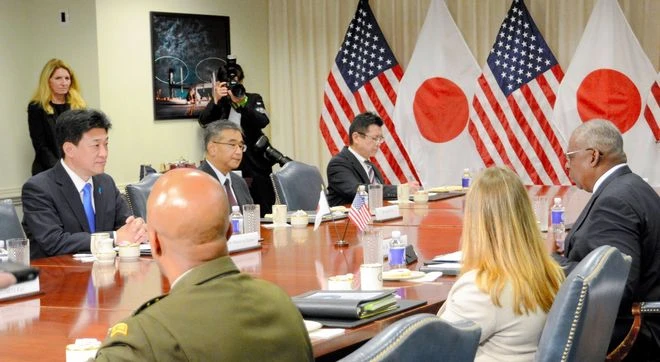New US-Japan Missile Plan Focuses on Countering Chinese Threat to Taiwan

Strengthening Deterrence in the Indo-Pacific
The new missile defense strategy, which involves both the development and deployment of advanced missile systems, aims to bolster deterrence against any potential Chinese invasion of Taiwan. The plan is part of a broader effort by both the US and Japan to address the growing military threat posed by China in the region, particularly following Beijing’s recent military maneuvers around Taiwan and its calls for reunification with the island nation.
The United States, as Taiwan's primary ally and supporter, has long expressed concern over the potential for a Chinese invasion, and has vowed to support Taiwan's defense if necessary. Japan, geographically closer to Taiwan, has also voiced its concerns about the growing Chinese military presence in the region, and is increasingly taking a more proactive role in regional security.
Key Features of the Missile Plan
The new missile defense strategy is centered around the deployment of cutting-edge missile systems that can detect, track, and neutralize incoming threats. Both countries are focusing on enhancing their ability to intercept ballistic missiles, cruise missiles, and hypersonic weapons, which are believed to be among China’s preferred tools for any potential invasion of Taiwan.
One of the key components of the missile plan is the installation of advanced radar systems that will improve early warning capabilities, giving the US and Japan a critical edge in detecting and responding to any military moves by China. This enhanced radar network will be integrated into both countries’ existing defense infrastructure, creating a more unified and responsive defense posture.
Additionally, both the US and Japan are reportedly investing in the development of more mobile and flexible missile platforms, which can be rapidly deployed in response to changing threats. These mobile missile systems are designed to be more adaptable and harder to target, increasing their effectiveness in a potential conflict scenario.
Strategic Implications and Response from China
The announcement of this new missile defense plan has been met with a swift response from China, which views Taiwan as a core part of its territory and has made it clear that it will not tolerate any foreign interference in its efforts to reunify with the island. Beijing has accused the US and Japan of stoking tensions and undermining regional stability with their military buildup.
China’s military has been increasing its presence near Taiwan in recent months, with frequent exercises and the deployment of more advanced weaponry. Analysts believe that Beijing is preparing for a potential military campaign to assert control over Taiwan, although the timeline and exact nature of such an operation remain uncertain.
In response to the new missile plan, China has issued strong statements condemning the US and Japan’s actions, warning that such moves will only escalate tensions in the region and could lead to a broader conflict. Chinese officials have also reiterated their stance that any attempts to intervene in Taiwan’s future will be met with force.
US-Japan Alliance and Regional Security
The growing security concerns in the Indo-Pacific have prompted a closer defense alliance between the United States and Japan. While Japan has traditionally maintained a pacifist stance since World War II, recent developments have led to a shift in its defense policy, with increased military cooperation with the US and greater investment in regional security.
Japan’s growing involvement in missile defense is seen as a significant shift in its military policy, particularly as it looks to counter China’s growing influence. As part of this broader strategy, Japan has also been strengthening its partnerships with other regional allies, including Australia, South Korea, and India, to create a more comprehensive security framework in the face of Chinese expansionism.
The US-Japan missile plan is also a clear indication that the two nations are prepared to stand firm against any threat to Taiwan’s sovereignty. Experts suggest that while a military conflict over Taiwan is not inevitable, the strengthened US-Japan defense posture serves as a powerful deterrent to any aggressive actions by China.
The Future of Taiwan’s Security
Taiwan’s security remains a critical issue for the region and the world. While the US and Japan’s missile defense plan is a step toward ensuring Taiwan’s defense, the situation is far from settled. China’s ambitions for Taiwan and the strategic importance of the island nation make it a flashpoint in the Indo-Pacific. The US and Japan’s efforts to enhance their missile defense capabilities will likely continue to evolve as they seek to maintain peace and stability in the region.
- Art
- Causes
- Crafts
- Dance
- Drinks
- Film
- Fitness
- Food
- Jocuri
- Gardening
- Health
- Home
- Literature
- Music
- Networking
- Alte
- Party
- Religion
- Shopping
- Sports
- Theater
- Wellness


